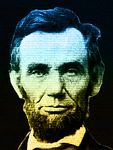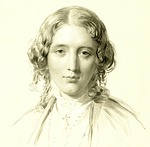Translating deep thinking into common sense
The Best Novel Nobody Has Read

By Robert Gore
October 5, 2014
SUBSCRIBE TO SAVVY STREET (It's Free)
Harriet Beecher Stowe’s Uncle Tom’s Cabin is the most well-known American novel that nobody reads. Histories of the Civil War invariably mention its role in stoking abolitionist sentiment, and President Lincoln greeted Stowe as “the little woman who wrote the book that made this great war.” The book’s characters have become part of American culture: Topsy, Sambo, Simon Legree, Little Eva, and of course, Uncle Tom, whose name has become an epithet connoting African-American servility. This is in effect circumstantial evidence that nobody reads Uncle Tom’s Cabin, because that epithet is an inappropriate, 180-degree-wrong defamation of a literary hero. The error would not persist if the novel were widely read or if scholars and critics devoted a fraction of the consideration to it that they devote to say, Moby Dick or Adventures of Huckleberry Finn.
The only thing that can be said about today’s dominant school of literary criticism is that there is none.
The only thing that can be said about today’s dominant school of literary criticism is that there is none. Traditional criteria for judging literature—plot, characterization, and theme—have been discarded, replaced with an attitude, rather than concrete tenets, that works be judged not so much by what the author has to say, but rather how he or she says it, and how well that fulfills whatever can be gleaned of the author’s intentions. Thus, evoking a mood, holding a mirror up to society, brilliant wordplay, or deep dives into inner consciousness are considered valid aims for books that offer little in the way of plot, characterization, or theme. If done with the approved political perspective in one of the approved styles―most of which violate dictums of clarity and concision taught in introductory writing classes―such books win favorable reviews and awards despite limited readership and quick descents into well-deserved commercial oblivion. Clear, concise writing is relegated to the low-rent district known as “genre” fiction, or the stuff people actually read.
However, these nebulous standards are applied only to contemporary “literary” fiction. When judging the classics, tenets of literary fashion and political correctness drop with the ruthless precision of a guillotine blade. This is most obvious concerning works with racial themes.
In nineteenth century America, even “progressive” white thinkers held convictions about African-Americans and their place in society that today make us recoil. Lincoln himself said, in one of his debates with Senator Stephen Douglas:
Unlike Lincoln, Stowe never characterizes African-Americans as inferior (the same cannot be said for Mark Twain, whose portrayal of Jim in Huckleberry Finn often plays to then popular  stereotypes), but she makes generalizations about the “black race” or “African race” that the modern reader will find cloyingly patronizing. To her credit, she had, from her extensive experience with actual African-Americans, slaves and free, concluded they were fully capable of living in white society if they were given the opportunity to do so and were educated. Her character George, a slave, works in a factory “where his adroitness and ingenuity caused him to be considered the first hand in the place,” inventing a machine that cleaned hemp. George was based on an actual slave who invented such a machine in Kentucky. She rejected forcibly sending freed slaves to Liberia (Lincoln’s preferred solution to that “problem”), instead arguing that the “church of the North” should receive them with open arms, offer religious instruction and education, then assist those skilled African-Americans who wanted to journey to Africa, a continent she felt harbored a great hope for humanity.
stereotypes), but she makes generalizations about the “black race” or “African race” that the modern reader will find cloyingly patronizing. To her credit, she had, from her extensive experience with actual African-Americans, slaves and free, concluded they were fully capable of living in white society if they were given the opportunity to do so and were educated. Her character George, a slave, works in a factory “where his adroitness and ingenuity caused him to be considered the first hand in the place,” inventing a machine that cleaned hemp. George was based on an actual slave who invented such a machine in Kentucky. She rejected forcibly sending freed slaves to Liberia (Lincoln’s preferred solution to that “problem”), instead arguing that the “church of the North” should receive them with open arms, offer religious instruction and education, then assist those skilled African-Americans who wanted to journey to Africa, a continent she felt harbored a great hope for humanity.
 Stowe exploded a common rationalization for slavery―that African-Americans did not have the same emotions as whites. She shows, in one powerfully dramatic scene after another, that their hearts break when their spouses or children are taken from them and sold “down the river,” just as white hearts would; that African-American women are as repulsed and shamed being sold into concubinage as any white woman would be; that slaves have the same love of freedom as whites and will take great risks to obtain it. Stowe’s lapses into patronization must be weighed against her espousal of what was, in 1852 when her novel was published, the truly radical position—even in the North—that blacks and whites are equals and could live together as such. The Fugitive Slave Law had been passed in 1850, mandating that runaway slaves who had made it north be returned to their owners, not met with Stowe’s open arms.
Stowe exploded a common rationalization for slavery―that African-Americans did not have the same emotions as whites. She shows, in one powerfully dramatic scene after another, that their hearts break when their spouses or children are taken from them and sold “down the river,” just as white hearts would; that African-American women are as repulsed and shamed being sold into concubinage as any white woman would be; that slaves have the same love of freedom as whites and will take great risks to obtain it. Stowe’s lapses into patronization must be weighed against her espousal of what was, in 1852 when her novel was published, the truly radical position—even in the North—that blacks and whites are equals and could live together as such. The Fugitive Slave Law had been passed in 1850, mandating that runaway slaves who had made it north be returned to their owners, not met with Stowe’s open arms.
Stylistic objections to the novel can be dispensed with more readily. The point of view is third person ultra-omniscient; Stowe opens the heads of all her characters, showing us what they think, and does not hesitate to tell us what she thinks as well. Today’s preference is for the first person and no authorial voice at all, but if the point-of-view criticism is valid, then we’ll have to throw out just about every book, American and British, written in the nineteenth century. The earlier writers had something to say; putting it in the minds of characters or directly from the author were often effective ways to do so, and there were no critical strictures against it. Perhaps modern authors limit themselves to the first person and quiet their own voices because they do not have as much to say.
The book concludes with a series of coincidences that gift wraps a happy ending and ties it up with a pretty ribbon. Such endings are unbelievable, but if the novel is to be dismissed because of it, there goes Huckleberry Finn, half of Dickens’ oeuvre, and many other novels of the period as well.
Sometimes critics, holding their noses, toss Stowe’s novel in the literary garbage can with one word―polemic―that supposedly excuses any further consideration of its merits. Here they refuse to extend the same courtesy they extend to modern writers of judging a book on its own terms. She sold 300,000 copies the first year (which would be like selling over 4 million copies today); it has been translated into thirty-seven languages, and it has never been out of print. Of course it is a polemic, but as Lincoln acknowledged, it helped spark the Civil War, making it perhaps the most effective polemic since the Bible.
Curiously, in our age of group politics and identification, it receives no discernible support from groups that might be thought to be its natural champions. Although it was the first undeniably significant book by an American woman, it is rarely studied in women’s literature classes. African-Americans cannot generally get past the odious Uncle Tom in the title, although no other book or tract did half as much for the slaves’ cause.
The book is seldom mentioned in Christian circles, although perhaps only Quo Vadis rivals it as a literary testament to the power of faith and forgiveness in the face of unbearable oppression. Tom refuses Simon Legree’s command to flog another slave, a woman, although he knows that Legree’s goons, Sambo and Quimbo, will beat him to a pulp. Later, he refuses to reveal the hiding place of two escaping women slaves, although he knows it will cost him his life, and forgives his torturers, which eventually drives Legree mad, but leads Sambo and Quimbo to redemption. How did this Uncle Tom become a symbol of servility? If he is servile, so were Martin Luther King and Christ. Many writers have tried to create Christ-figure heroes. With Tom, Stowe succeeds (Little Eva’s pure faith and angelic goodness work less well), against the real life backdrop of American slavery, but her book is unacknowledged and forgotten, while novels about future raptures that instantaneously confer heaven on the true believers as the infidels are “left behind,” sell millions.
The consideration of its religious aspects gets us closer to the real “problem” of Uncle Tom’s Cabin in modern eyes. Stowe never wavers: slavery is absolutely incompatible with Christianity, and while slavery may deny people their freedom, nothing can deny people’s right to freedom. Our age (including many of the religious) abhors anything that smacks of an absolute; Stowe’s absolutism gives no quarter.
However, she is too smart a polemicist to show only the Simon Legree type of slaveowner-tyrant. First we see “kind” slaveowners, regularly churchgoers, treating their slaves well by the standards of the day. Stowe uses their stories to skewer the era’s “gray area” thinking and rationalizations, some of which cite the Bible. Nothing guarantees that such a slaveowner will not incur debt and have to sell slaves and break up their families, or that such a slaveowner will not die before he fulfill his promise to free a slave, with that slave then sold to an owner like Legree. Just because there are “good” slaveowners does not mean there are not evil ones. Only towards the end of the book do we see the horror of Legree, a slaveowner who, under color of law, could and did do anything he wanted to his slaves, his property.
Slavery, regardless of the magnanimity or piety of the slaveowners, is an absolute wrong because it denies slaves their freedom, an absolute right. Stowe’s ode to George and his wife Eliza’s freedom after they have escaped to Canada is magnificent:
These are timeless words from a classic novel that cannot be ignored. It is time for America to rediscover Stowe’s masterpiece.
Related Posts:
About the Author: Robert Gore
-

Transcript: Ayn Rand and the Austrian Economists
April 16, 2024
-

After the Founding: The Demise of Laissez Faire in America
April 6, 2024
-

Doubt and Certainty
March 26, 2024
-

Transcript: Nicolás Cachanosky Interviewed on The Savvy Street Show
March 19, 2024
-
Nicolas Cachanosky on The Savvy Street Show discussing Javier Milei
March 11, 2024
-

A Hero for the Generations: The Enduring Romanticism of the Tarzan...
March 9, 2024
-

Transcript: Walter Block Interviewed on The Savvy Street Show
March 6, 2024
-
Walter Block on The Savvy Street Show
March 5, 2024
-

2024: Spreading Objectivism Face to Face
March 2, 2024
-

You Could Go to Prison for What You Write
February 26, 2024
